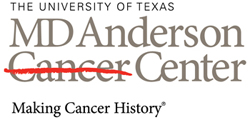Brentuximab Vedotin (SGN-35) for Relapsed CD30-Positive Lymphomas
This morning I was delighted to see that one of my favourite medical doctors on Twitter, Dr Anas Younes from MD Anderson, has published a paper in the New England Journal of Medicine on a clinical trial of a promising new agent in development for a particular type of lymphoma.
 Dr Younes is very active in social media on Twitter and Facebook and has garnered quite a following of lymphoma patients interested in learning about new treatments for the disease. This also means that patients and caregivers following him are able to find out about new clinical trials as they open up. MD Anderson Cancer Center probably has access to more clinical trials across all tumour types than any other cancer center, offering lots of options for cancer patients to receive novel therapies that may help their condition. Another benefit of a physician being involved with social media is that awareness of the trials will reach more people this way and hence probably accrue faster.
Dr Younes is very active in social media on Twitter and Facebook and has garnered quite a following of lymphoma patients interested in learning about new treatments for the disease. This also means that patients and caregivers following him are able to find out about new clinical trials as they open up. MD Anderson Cancer Center probably has access to more clinical trials across all tumour types than any other cancer center, offering lots of options for cancer patients to receive novel therapies that may help their condition. Another benefit of a physician being involved with social media is that awareness of the trials will reach more people this way and hence probably accrue faster.
What’s new in Hodgkins Lymphoma?
Before we discuss the NEJM paper, the other side of social media is that MD Anderson also use it to communicate the results of their trials on the Institution website and Dr Younes also has a nice video for patients, explaining how the drug works, about the trial and the results that they found.
Now, this was a phase I trial so normally we wouldn’t expect to see too much from an efficacy standpoint, as the main goal of these studies is to assess the range of toxicities and determine the maximum tolerated dose (MTD) for phase II trials, which look at the efficacy signal in more detail.
That said, what Dr Younes and his colleagues found was quite impressive responses in a disease that has not seen much in the way of new treatments for more than a decade.
It should be noted that the agent targets CD30 antigen that is expressed on Hodgkin Lymphoma and anaplastic large-cell lymphoma (ALCL) cells. Previous attempts to target the CD30 antigen with monoclonal-based therapies have shown minimal activity. What’s different about this new agent is that it is an antibody-drug conjugate (ADC), with an anti-CD30 monoclonal antibody linked to monomethyl auristatin E (MMAE), an anti-cancer agent.
The drug they were evaluating, brentuximab vedotin (SGN-35), from a partnership between Seattle Genetics and Millennium, elicited complete responses (CR) or partial responses (PR) in 38% of the patients with Hodgkin Lymphoma (HL). In the NEJM article it boldly stated that:
“The median duration of response was at least 9.7 months. Tumor regression was observed in 36 of 42 patients who could be evaluated (86%).”
Looking at the data in the article, what was amazing was that there were 17 objective responses (38%), 11 of which (25%) were complete remissions, which essentially means disappearance of all evidence of the disease. In addition, CT scans showed that 36 of 42 (86%) of evaluable patients saw their tumours shrink.
What’s next?
Overall, I think these very promising results raise hopes that the phase II trial will also produce positive results at the American Society of Hematology (ASH) in December, which will be really great news for patients with Hodgkin Lymphoma.
If the phase II results also look positive, then we can probably expect Seattle Genetics and Millennium to file in the first half of 2011.
![]() Younes, A., Bartlett, N., Leonard, J., Kennedy, D., Lynch, C., Sievers, E., & Forero-Torres, A. (2010). Brentuximab Vedotin (SGN-35) for Relapsed CD30-Positive Lymphomas New England Journal of Medicine, 363 (19), 1812-1821 DOI: 10.1056/NEJMoa1002965
Younes, A., Bartlett, N., Leonard, J., Kennedy, D., Lynch, C., Sievers, E., & Forero-Torres, A. (2010). Brentuximab Vedotin (SGN-35) for Relapsed CD30-Positive Lymphomas New England Journal of Medicine, 363 (19), 1812-1821 DOI: 10.1056/NEJMoa1002965
3 Responses to “Brentuximab Vedotin (SGN-35) for Relapsed CD30-Positive Lymphomas”
[…] This post was mentioned on Twitter by eyeonfda, Sally Church, Sally Church, Anas Younes, M.D., Serena Stockwell and others. Serena Stockwell said: RT @MaverickNY: Impact of oncologists getting involved w/ social media? Faster clinical trial enrollment: http://bit.ly/cFfI7W Nice job … […]
[…] on the data we saw at the recent American Society of Hematology meeting in December, the recent NEJM publication, this is very good news indeed for […]
[…] have previously covered the excellent data for brentuximab vedotin (Adcetris) in Hodgkin Lymphoma, but the new data presented in ALCL in the poster session was, in ways, even more dramatic as you […]
Comments are closed.